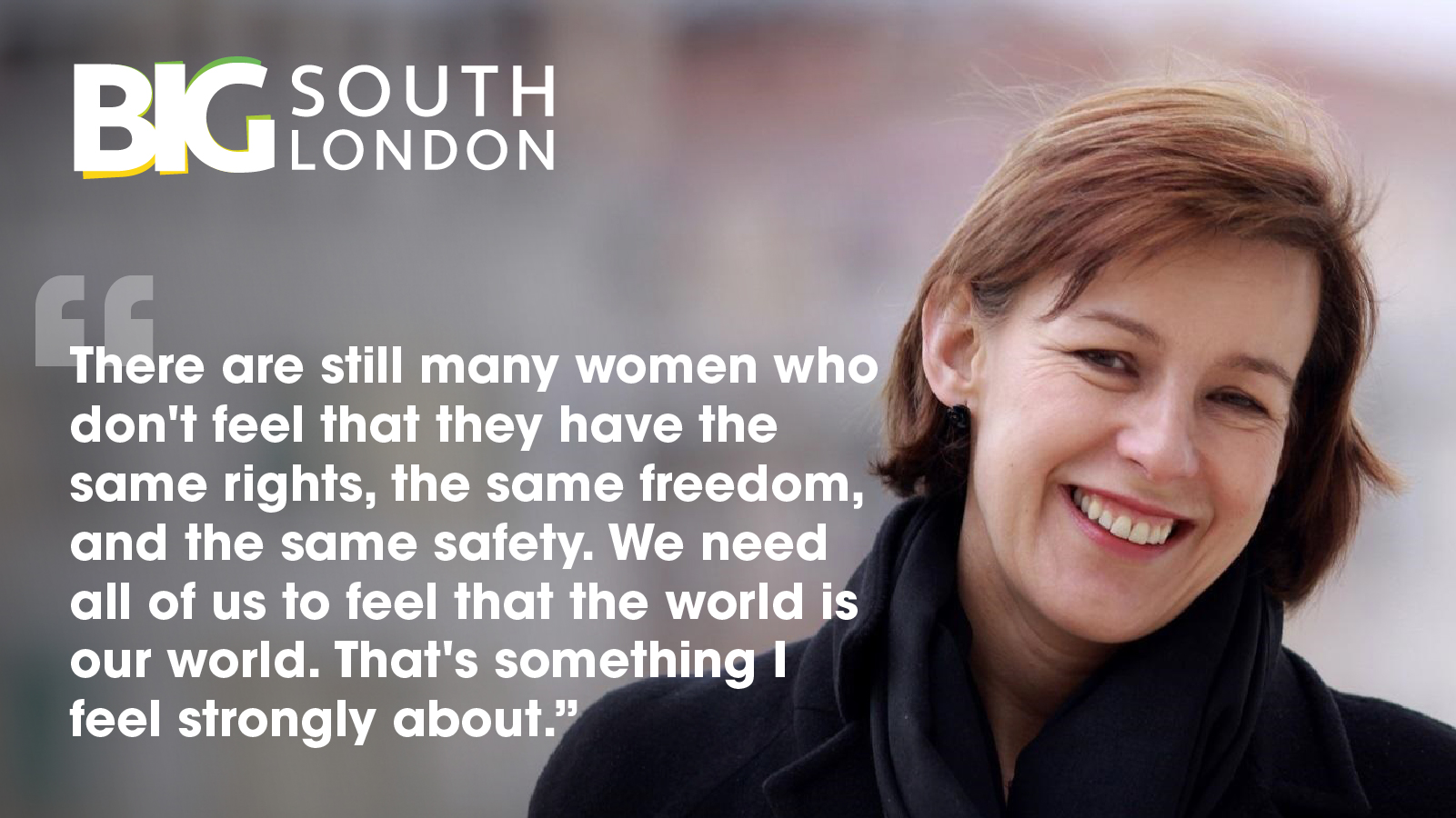Celebrating inspirational women in South London; Helen Bailey

Following International Women’s Day we’re continuing our celebration of women. We sat down with some inspiring women in South London to discover what this year’s theme, ‘Inspire Inclusion’, means to them.
Helen Bailey is the chief executive of the London Borough of Sutton and is responsible for ensuring the council delivers the programme of its elected members and meets its statutory obligations such as providing social care and public health services. Helen has been chief executive at Sutton for five years.
Her experience includes being chief executive of two other councils, director of public services at the Treasury and running other public and private organisations.
She loves the variety of her role – delivering big strategic projects such as the development of the London Cancer Centre, collaborating with local businesses and voluntary groups and having personal contact with local citizens who depend on the council’s services.
The theme of International Women’s Day this year was inspiring inclusion. What does that mean to you?
We know there’s inequality and we see it and often experience it in our daily lives, but for so many of us here and around the world it was brought home to us powerfully by two shocking events in the last four years – the murder of George Floyd in America, and the pandemic and the way it disproportionately affected some of our communities. Like many other people, our council went on a journey to talk with and listen to our organisation about what that meant.
Some of the things that stay with me from those conversations include some of the reverse mentoring we’ve done. People tell each other about their stories in a space that’s quiet and private, allowing senior decision-makers like myself to listen to people whose life experiences are very different and unexpected.
You look at me now and might assume I’ve had a certain set of experiences, but when I started work it was unusual to see women in senior positions, including in the public sector. When I became Chief Executive in Islington I was one of maybe 10 female Chief Executives across London, fewer than a third. Before that, I’d worked in a private sector consultancy where there was a lot of sexual banter that we would now all think was unacceptable.
Across my career, at work and in voluntary organisations I’ve been involved in, I’ve been trying to walk the tightrope between helping women to open the doors for themselves and each other, while being clear with male colleagues why that support and encouragement is needed – because access to opportunities and senior roles has often been geared around access for men.
I’ve met a lot of women who say, “I don’t join women’s groups, or get involved in the equality conversation because I don’t want special treatment,” but it’s not about special treatment. In most jobs in senior public service, when people go out to recruit them, the picture in their head is often still of a man in a suit, not of a woman. We need to change that. A lot of the mentoring and equality work that we do is about saying to everybody, men and women, here’s a picture of somebody else who could do that job. They don’t look like the parade of men who have done it since the dawn of time.
So, that’s partly what inspiring inclusion means to me, how you find role models – say here’s this person, they have this background, and they’re a woman doing a job that’s unusual to see a woman doing. But also to be clear that women don’t have to be any more perfect in a role than a man – inclusion is about having role models but having realistic expectations of them.
For me, inclusion works on a whole bunch of levels, and I probably hadn’t thought enough about the implications of increasing disability until I woke up one day last year and discovered that I had a disease that was going to take my eyesight away. I’ve been thinking about it a lot over the last nine months because that’s what’s been happening to me.
Is there a woman you’ve met, who has really stood out for you?
I’m lucky in Sutton that we have a strong and experienced female leader, who’s just recently announced that she’s stepping down, she’s outstanding. Among my colleagues, I’ve got some great women. Emily and Nisha in our HR department have championed the inclusion work we’ve been doing as a council and making sure that we talk about how we have tough conversations, whether that’s about issues to do with gender, race or other things that make the world an inclusive place.
I’ve been privileged to know lots of inspiring women. My first Chief Executive job was in Islington and my predecessor there was a woman, Leisha, who was absolutely inspiring in her ability to make the organisation work in difficult circumstances. Across London, there are some fabulous female Chief Executive colleagues, whose advice I would take and who are immensely thoughtful about inclusion and communities and the way they personally act as role models for their communities.
Aside from International Women’s Day and Women’s History Month, what more do you think we can do as a local community in South London? And then more on a regional basis as well?
I think there’s so much that we can do, I think we have to make sure we are listening out for women’s and girls’ voices in everything we do. One of the things that obsesses me is people’s sense of safety. What I find hard is how do you help women and girls to feel safe to live their lives with as much freedom as men and boys do? I don’t want to disrespect the experience of anybody who feels unsafe on a high street at night, but I spent four years of my life working very closely with the police in London. I used to see the stats every day and we know that, sadly, women are statistically most unsafe, not in the street, but in and close to the home. Most violence against women and girls, statistically, comes from people they know. It is men who are less safe in the street because men are more likely, statistically speaking, to become involved in a confrontation with a stranger in a pub or a public place.
The reason I talk about this is because it has been a matter of pride to me that I wanted to live my life as a woman in London, with the freedom to go anywhere I wanted to, and not to worry about my safety. I’ve also felt that I want to communicate that because I think part of being included is to feel that the world belongs to you as much as it does to the next person and that you have the same rights to be on public transport, to go to places, to have a meal in a restaurant on your own, to sit in a pub by yourself if you choose.
It is concerning to me that in the 21st century, there are still many women who don’t feel that they have the same rights, the same freedom, and the same safety to do that. Women might not be at the public meetings, they might not come to events, they might be less willing to put their hand up and shout out about something that concerns them, and we need women to do that. We need all of us to feel that the world is our world. That’s something I feel strongly about.
If you had to identify one woman throughout time who has inspired you personally who would that be and why?
My great aunt Elsie. She was born in the last days of Queen Victoria’s reign at the turn of the 20th century and grew up in a small village in Dorset, expecting her future would be to be married and have children and continue living in a small village in Dorset. The First World War changed things for women in this country – it meant a lot of women of her generation didn’t get married because the men they might have married went away to war. During the war, women started to do jobs previously only done by men. So, instead of staying in that village Elsie came to London and got a job, worked in Whitehall and enjoyed a career. She never married, she never had children and her friends and work gave her a sense of worth and importance in the world.
Because she and others of her generation made a great life for themselves without meeting the expectations of their parents and families and without just tumbling into marriage and children, I grew up understanding these things were choices.
I think the greatest gift you can give any woman is choice and a sense of having realistic alternatives. I am a single woman, and I don’t have children, but I feel that’s a choice and not something that was forced upon me. I absolutely support and encourage women who want to put their lives into their families, and women who want to combine families and work, and the range of different ways in which people manage their lives should be equally valued, and equally acceptable. I’ve had a great life and I’ve been very lucky to have choices in it, and I would love to give that to everybody else.


